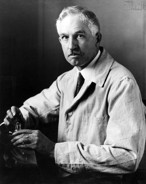Rufus Cole, the Guiding Philosophy of the Rockefeller Hospital, and the First Effective Therapy for Lobar Pneumonia

Cole, Rufus
Courtesy of the Rockefeller Archive Center
At the turn of the twentieth century, one of the leading causes of death in the United States was lobar pneumonia—bacterial pneumonia caused by Streptococcus pneumoniae. When the Rockefeller Hospital opened in 1910, lobar pneumonia was one of five diseases selected as the focus of the hospital's research program. So urgently was a therapy for this disease needed that the hospital's first director, Rufus Cole (1872-1966), made it his own research priority. Over the next several years more than 500 patients with lobar pneumonia were admitted to the Rockefeller Hospital.

Dochez, Alphonse
Courtesy of the Rockefeller Archive Center
Cole followed a strategy that had been successful in treating other infectious diseases. Working with Alphonse Dochez (1882-1964) he made an antiserum from the blood of horses inoculated with bacteria isolated from pneumonia patients. The researchers soon discovered that there were different strains of pneumococcus, as the bacterium was then called, and that they differed in virulence. By the end of 1912, Cole and Dochez had developed a serum against Type 1 pneumococcus and had devised a method for testing whether a patient was infected with this or some other type of the bacterium. The horse antiserum was the first effective treatment for infection with Type 1 pneumococcus. The development of antisera continued in Cole's laboratory. In addition, during World War I, Army and Navy medical officers came to the Rockefeller Hospital before being dispatched to base hospitals to learn methods of typing pneumococci and treating patients selectively.
When Cole added Oswald T. Avery (1877-1955) to his research team in 1913, his goal still was to find a cure for lobar pneumonia. But Avery's contributions over the next decades had even greater scientific significance. Avery's studies linking the chemical nature of pneumococcus to its virulence led to one of the most significant discoveries in biology: that DNA is the genetic material.

Apparatus for injection of serum against Type 1 pneumococcus
Cole's achievements as the Hospital's first director had an even wider impact on medicine than his research. His vision was to make the Hospital a place where laboratory research and patient care were integrated in the investigation of the underlying causes of disease. In the early 1900s this was a novel idea. The dozens of clinical investigators Cole trained moved on from their Rockefeller posts to become the leaders who transformed medicine into a scientific, academic discipline in the first half of the twentieth century. By the end of Cole's career, some 22 alumni of the Rockefeller Hospital had been elected to the U.S. National Academy of Sciences, and it was estimated that about half of the full-time chiefs of internal medicine in the United States had trained there.
Rufus I. Cole received his undergraduate degree from the University of Michigan at Ann Arbor (1896) and the MD from The Johns Hopkins University Medical School (1899). At Hopkins he was influenced by the leading lights of American medicine, including William H. Welch, William Osler, and Lewellys F. Barker. Cole remained at Hopkins, first as a member of the resident staff and later as head of the biological laboratory. During that time he became committed to the idea that full-time physician-investigators should lead medical schools, in contrast to an earlier era when most medical teaching was done by doctors who made their living as practitioners. Cole also spent the year 1903-1904 at the Koch Institute in Berlin. He was appointed to the Rockefeller Institute in 1908, becoming the Hospital's first director even before it opened, and remained in that position until his retirement in 1937. Cole's achievements were recognized by the Kober Medal of the Association of American Physicians (1938) and the Academy Medal of the New York Academy of Medicine (1963). He was elected to the U.S. National Academy of Sciences (1922) and was the recipient of its Kovalenko Medal (1966).
Selected Publications
Cole R. Treatment of pneumonia by means of specific serums. JAMA, 1913, 61: 663
Avery OT, Chickering HT, Cole R, and Dochez AR. Acute Lobar Pneumonia. Prevention and Serum Treatment. Monographs of the Rockefeller Institute for Medical Research, 1917, no. 7
Further Reading
Hirsch J. Rufus Cole and the clinical approach. In Stapleton DE, ed. Creating a Tradition of Biomedical Research: Contributions to the History of The Rockefeller University. New York: Rockefeller University Press, 2004
Miller CP. Rufus Cole (1872-1966): A Biographical Memoir. Washington, DC: National Academy of Sciences, 1979
http://www.nasonline.org/site/PageServer?pagename=MEMOIRS_C
Corner GW. A History of the Rockefeller Institute, 1901-1953: Origins and Growth. (New York: Rockefeller Institute Press, 1964)
